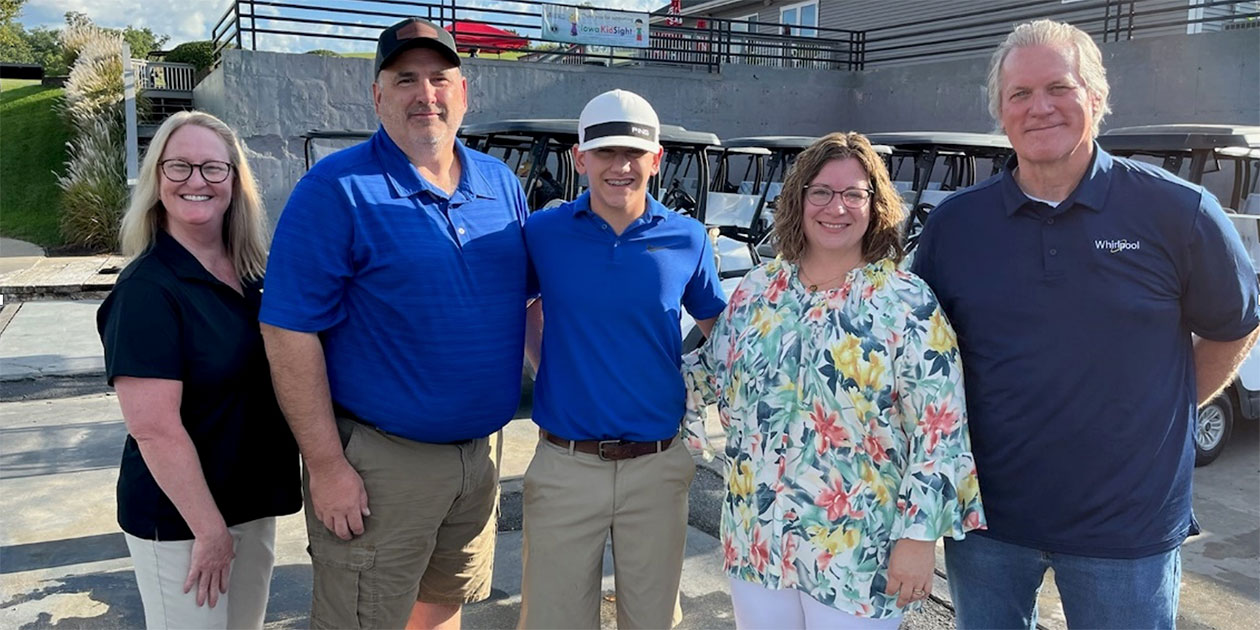Iowa KidSight Program Focuses on Childhood Vision Health
 PHOTO COURTESY WHIRLPOOL CORPORATION
From left, Lori Short, program manager of Iowa KidSight; Leon, Brady, and Heather Hospodarsky; and Doug Mechaelsen, director of operations at Whirlpool-Amana Division, are pictured at the annual Whirlpool Suppliers Golf Tournament earlier this year in Amana. The fundraising tournament raised more than $23,000 for Iowa KidSight.
PHOTO COURTESY WHIRLPOOL CORPORATION
From left, Lori Short, program manager of Iowa KidSight; Leon, Brady, and Heather Hospodarsky; and Doug Mechaelsen, director of operations at Whirlpool-Amana Division, are pictured at the annual Whirlpool Suppliers Golf Tournament earlier this year in Amana. The fundraising tournament raised more than $23,000 for Iowa KidSight.
Heather and Leon Hospodarsky’s son, Brady, was 2 years old when he brought home a manila envelope from daycare. Inside were the results of a vision screening conducted by local Lions Club volunteers through Iowa KidSight, a statewide program based at the University of Iowa.
The test identified a potential deficiency in Brady’s vision and recommended a follow-up with an eye care professional. A local eye doctor soon confirmed their son had amblyopia, a condition commonly known as “lazy eye,” which can occur in young children when their neural pathways fail to develop.
Brady was legally blind in his left eye, limiting his depth perception and peripheral vision. Yet his parents were unaware until the KidSight screening. For the next several years, Brady’s doctor had him wear a patch periodically over his stronger eye to force his left eye to strengthen.
 PHOTO COURTESY IOWA KIDSIGHT
Ellie Naaf of Fort Dodge is among the many Iowa children who have been benefited from a vision screening by Iowa KidSight, which led to her new pair of eyeglasses. The Fort Dodge Lions Club is home to some of Iowa KidSight’s most active volunteers, who screen thousands of children each year across three counties.
PHOTO COURTESY IOWA KIDSIGHT
Ellie Naaf of Fort Dodge is among the many Iowa children who have been benefited from a vision screening by Iowa KidSight, which led to her new pair of eyeglasses. The Fort Dodge Lions Club is home to some of Iowa KidSight’s most active volunteers, who screen thousands of children each year across three counties.
“With amblyopia, you have a window of time to correct the vision while the nerve pathways are developing,” Heather Hospodarsky says. “Brady was given time to correct his vision through KidSight that he wouldn’t have had otherwise.”
Since 2000, Iowa KidSight volunteers have helped thousands of children like Brady in each of the state’s 99 counties through a partnership between Lions Club of Iowa and the UI Department of Ophthalmology and Vision Sciences. Lions Club volunteers visit local daycares and preschools where they perform the free, voluntary vision screenings using specialized digital cameras. The images are then interpreted by a UI ophthalmology specialist for issues like farsightedness, nearsightedness, cataracts, muscle imbalances, and astigmatisms.
Of the 50,000 Iowa children that KidSight screens on average per year, about 5 percent are flagged for potential vision problems and referred to an eye doctor. The program has identified nearly 40,000 children with vision issues over the past 22 years. In some cases, it has detected problems that—if left untreated—could result in permanent vision loss, says Lori Short, program manager for Iowa KidSight.
“The great thing about this program is that it helps asymptomatic kids,” says Short. “Almost every single letter we get back from parents starts with, ‘I had no idea that my kid wasn’t seeing that well.’”
John Stoll, an Iowa City Noon Lions Club member who coordinates the KidSight program for Johnson County, estimates he’s screened nearly 10,000 children to date. One of the first kids he tested was his own grandson at a daycare in North Liberty. “That’s all they needed to do to get me hooked on it,” says Stoll, a retired loan officer who jokes that he now works for high fives and hugs from the kids.
Stoll still remembers one combative boy whom he chased around a daycare room during a screening with his camera. When the boy hid under a table, Stoll laid on the floor to snap a quick image. He was glad he did—the results showed that the child’s vision was poor, and he was eventually fitted for glasses. The next year when Stoll returned to the daycare, the director told him the difference in the boy’s behavior was night and day.
“They were literally days away from kicking the kid out of daycare because they couldn’t control him,” Stoll says. “He couldn’t see anything without putting it to his face—that’s the reason he was fighting anybody and everybody. He got his glasses and became the model daycare child.”
The Hospodarskys likewise count themselves among KidSight’s many success stories thanks to early intervention. Today, Brady is a high school freshman who, with the help of his contacts, has near-perfect vision. He enjoys golfing with his father and grandpa, and he plans to play for his high school golf team this spring in Alburnett, Iowa. This past fall, the family participated in the annual Whirlpool Suppliers Tournament in Amana—a golf fundraiser that brought in more than $23,000 for Iowa KidSight.
“We’re incredibly grateful for the KidSight program, the volunteers who make it happen, and those who contribute financially,” Heather Hospodarsky says. “We want to help give back too and spread the word about the program.”
